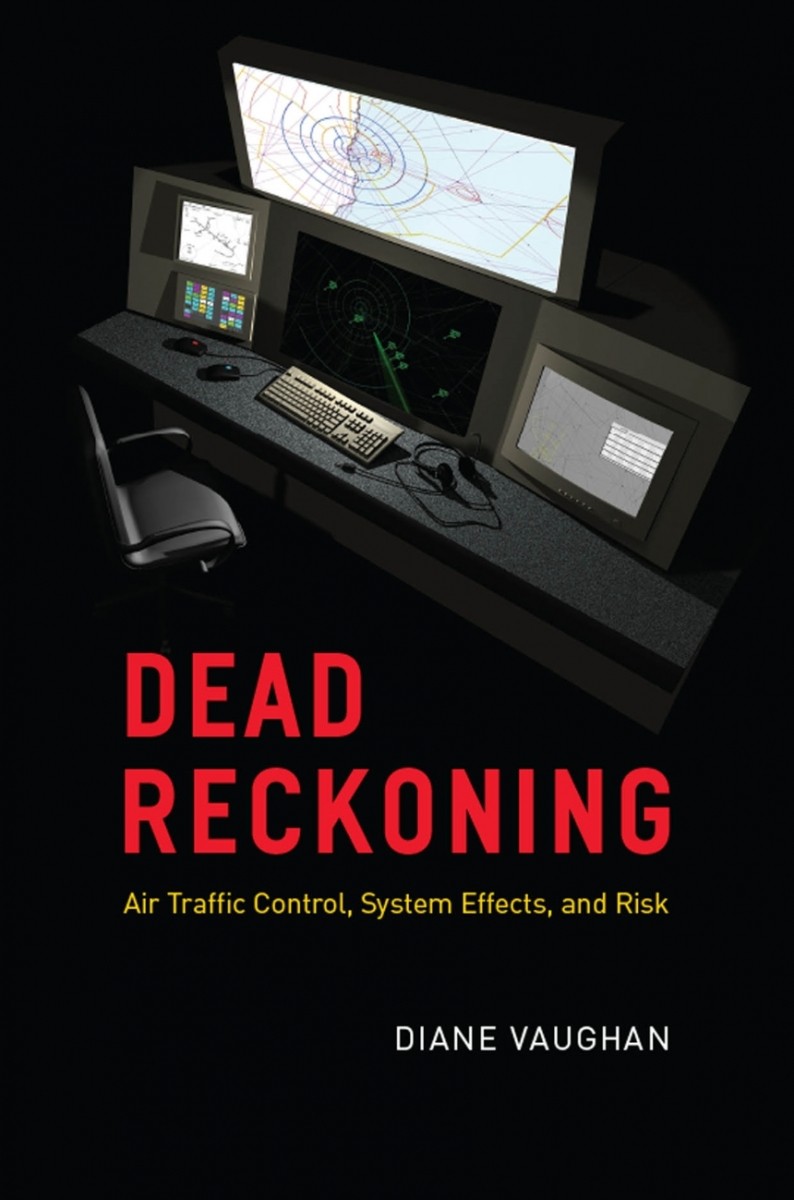Celebrating Recent Work by Diane Vaughan

Celebrating Recent Work by Diane Vaughan
Dead Reckoning: Air Traffic Control, System Effects, and Risk
---
Register here for virtual attendance via Zoom Webinar
Register here for in-person attendance at the Heyman Center Common Room. In-person attendance is for Columbia Univesity affiliates only. Reception to follow panel.
Vaughan unveils the complicated and high-pressure world of air traffic controllers as they navigate technology and political and public climates, and shows how they keep the skies so safe.
When two airplanes were flown into the World Trade Center towers on September 11, 2001, Americans watched in uncomprehending shock as first responders struggled to react to the situation on the ground. Congruently, another remarkable and heroic feat was taking place in the air: more than six hundred and fifty air traffic control facilities across the country coordinated their efforts to ground four thousand flights in just two hours—an achievement all the more impressive considering the unprecedented nature of the task.
In Dead Reckoning, Diane Vaughan explores the complex work of air traffic controllers, work that is built upon a close relationship between human organizational systems and technology and is remarkably safe given the high level of risk. Vaughan observed the distinct skill sets of air traffic controllers and the ways their workplaces changed to adapt to technological developments and public and political pressures. She chronicles the ways these forces affected their jobs, from their relationships with one another and the layouts of their workspace to their understandings of their job and its place in society. The result is a nuanced and engaging look at an essential role that demands great coordination, collaboration, and focus—a role that technology will likely never be able to replace. Even as the book conveys warnings about complex systems and the liabilities of technological and organizational innovation, it shows the kinds of problem-solving solutions that evolved over time and the importance of people.
About the Author:
Diane Vaughan received her Ph.D. in Sociology, Ohio State University, 1979, and taught at Boston College from 1984 to 2005. During this time, she was awarded fellowships at Yale, the Centre for Socio-Legal Studies at Oxford, the American Bar Foundation, the Institute for Advanced Study at Princeton, the John Simon Guggenheim Memorial Foundation, and the ASA award for Public Understanding of Sociology. She came to Columbia in 2005.
Influenced by Simmel’s work on social forms as a graduate student, she has developed analogical theorizing: a method of developing general theoretical explanations by cross-case comparison of similar events, activities or phenomena across different organizational forms. Since then, she has written three books on how things go wrong in organizations: Controlling Unlawful Organizational Behavior, Uncoupling, and The Challenger Launch Decision. The fourth book in the project, Dead Reckoning: Air Traffic Control, System Effects, and Risk (August 2021) is her negative case, looking at how the air traffic control system gets it (mostly) right.
About the Speakers:
Gil Eyal: I work in a broad field, which encompasses sociological research on science, medicine, professions, intellectuals and knowledge, especially as these intersect with political and legal institutions. I call this the sociology of expertise, because this term does not prejudge who or what is included within the field. I am interested in what scientists and professionals do, but also in how ordinary people as “lay experts” put together novel forms of expertise. Focusing on “expertise” also means that in my research I am interested not only in who is considered an expert, but also in what is necessary to be in place for the expert performance of a task. Currently, I am especially interested in understanding the causes and dimensions of the contemporary mistrust of experts, including the attempts to cast doubt on the findings of climate science, the refusal of parents to vaccinates their children, or the dismissal of sober assessments by economic experts (e.g. at the time of the Brexit debate). While there is a lot of handwringing today about living in a “post-truth” world, I think that what we are witnessing now are symptoms of a recursive crisis, something that has happened before and will continue to happen. Put succinctly, the “scientization” of politics (namely the dependence of liberal democracies on expert knowledge for most tasks of governance) leads to the politicization of science, and the two processes constantly feed off and amplify one another.
Iddo Tavory is an Associate Professor of Sociology at NYU, the Director of Graduate Studies, and Editor of Sociological Theory. His research interest areas include: Sociology of Culture; Theory and Method in Ethnography; Sociology of Religion; Phenomenology; Pragmatism; Temporality; Interaction; Social Theory.
Venkat Venkatasubramanian is the Samuel Ruben-Peter G. Viele Professor of Engineering. By inclination and education, Venkatasubramanian is attracted to foundational questions that are at the intersection of different disciplines. A leitmotif in his work is understanding emergent phenomena in self-organized and complex dynamical systems, particularly using artificial intelligence, statistical mechanics, game theory, and systems engineering concepts and techniques.
Moderated by:
Bruce Western is the Bryce Professor of Sociology and Social Justice and Director of the Justice Lab at Columbia University. He studies poverty and socioeconomic inequality with a focus on the U.S. criminal justice system. Current projects include a randomized experiment assessing the effects of criminal justice fines and fees on misdemeanor defendants in Oklahoma City, and a field study of solitary confinement in Pennsylvania state prisons. Western is also the Principal Investigator of the Square One Project that aims to re-imagine the public policy response to violence under conditions of poverty and racial inequality.
Register here for virtual attendance via Zoom Webinar
Register here for in-person attendance
This event is sponsored by ISERP, the Society of Fellows and Heyman Center for the Humanities, the Dean of the Division of Social Science, and the Sociology Department.
